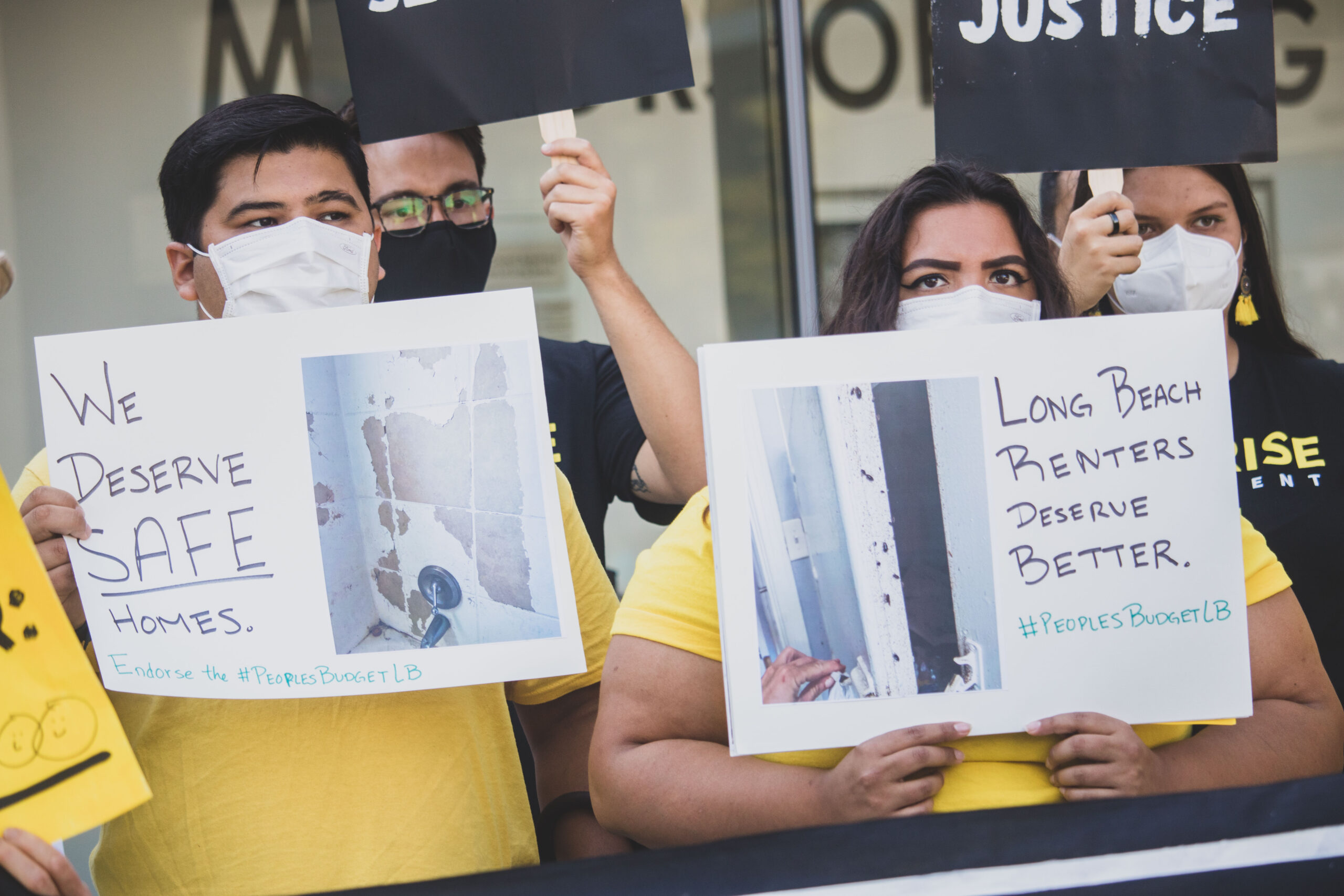Homelessness Prevention Cannot Exclude Renters On The Brink Of Displacement
6 minute readIn January, the Long Beach City Council declared a state of emergency for homelessness under the leadership of Mayor Rex Richardson and Councilmember Mary Zendejas. On Feb. 7, the city built on this commitment by investing $12 million to increase capacity to address the homeless crisis and other elements of the mayor’s 100-Day Plan.
These initiatives give some hope that long overdue care, services, and housing will finally reach the families and individuals who need it. Pamela West, a lifelong resident of north Long Beach, is an in-home care provider who has seen families defeated by the lack of streamlined support systems for folks dealing with homelessness. The devoted grandmother and community leader recalled how one of her clients was displaced when his grandmother passed away and their home was sold. Pamela helped him petition for support from the Multi-Service Center but they were consistently turned away. She said, “The capacity is met at the door before you even get in. They say, ‘We only help 25 a day. Come back tomorrow.’ Line up at 7 a.m., open at 8 a.m. Some people sleep in the parking lot overnight just to be turned away.” Her client has lived in his van ever since.
While we let ourselves experience hope, we can’t ignore that the homelessness crisis will remain difficult to solve if legislative action isn’t taken soon for renters on the brink of being displaced. For a homelessness prevention plan to be effective it must include tenant protections.
We have seen how tenant protections can effectively reduce homelessness because of Los Angeles County’s emergency eviction protections, which kept people in their homes when pandemic-related financial strains caused them to fall behind on rent payments. According to the Los Angeles Homeless Services Authority’s annual count, officials “attributed the decelerating growth of the homeless population to policies enacted during the pandemic, such as the federal and state unemployment relief, rent and eviction moratoriums, utility assistance programs, and boosting the region’s shelter capacity.”
Unfortunately, these countywide tenant protections are due to end this month on March 31.
Renters are often just one medical emergency, missed paycheck, or rent increase away from being unable to afford where they live, and the pandemic only made things worse. No one should have to choose between paying for shelter or meeting basic needs such as food and healthcare. Yet, these continue to be the decisions renters are forced to make as wages and fixed incomes fail to keep up with rising rents and costs of living.
True affordability continually moves further from the grasp of renters, leaving them perpetually vulnerable to evictions and losing their homes. Many tenants, despite being able to stay up to date on rent payments, live in uncertainty about being displaced if their rents increase or if they are evicted through no fault of their own (such as in the case of a landlord claiming the need to do a substantial remodel of the rental property). Despite local laws that allow tenants to receive relocation assistance when evicted through no fault of their own, picking up the pieces and finding housing within the city is difficult. On average, the lowest monthly rent in Long Beach is around $1,800 and rent prices are only projected to increase in Los Angeles County in the coming years. Long Beach is a majority renter city (67% of the population) and the majority of those renters are low-income, families of color. How can these families keep up with these prices and what are we doing to live up to the rhetoric of the Framework of Reconciliation in regard to housing equity?
Tomisin Oluwole
Dine with Me, 2022
Acrylic on canvas
36 x 24 inches
Click here to check out our interview with Tomisin Oluwole, a literary and visual artist based in Long Beach.

Instead of gunking up our site with ads, we use this space to display and promote the work of local artists.
County protections coupled with county programs like Stay Housed L.A., which is a “Right to Counsel” pilot program that connects renters with free legal services and resources about their rights, have given renters a higher chance of remaining safely in their homes. However, the future of these highly needed tenant protections and programs is unclear in Long Beach.
Between the fiscal years 2021 and 2022, the City of Long Beach allocated a total of $1.06 million in funding toward housing supports that connected residents to services and provided information about local, state, and federal tenant protection programs. (For FY 2021, see page 2 of Mayor Robert Garcia’s Budget Memo for the $250,000 allocation. For FY 2022, see page 5 of the Long Beach Recovery Act Program Allocations for the $810,000 allocation.) Some of those funds also went toward expanding the Stay Housed L.A. / Right to Counsel program.
Although funding for the program is set to expire soon, Long Beach saw a resurgence in evictions in 2022, with over 3,000 filings bringing the number of evictions filed back to pre-pandemic levels. Despite many public comments supporting the Right to Counsel, the City Council did not provide any funding in the FY 2023 city budget (adopted September 2022). As we near the county tenant protections ending, the city council needs to not only continue funding a Right to Counsel program but expand it to serve more residents in need in Long Beach, especially undocumented immigrants.
Providing such services to residents is important; renters facing evictions are more likely to be able to stay in their homes when they have access to legal representation. Areli Delgado, a single mother of two, says she lives in constant fear of being displaced since an injury has prevented her from working and severely impeded her ability to pay rent. On top of ongoing struggles to hold her landlord accountable for making necessary repairs to her building, access to free legal services could be critical in preventing an eviction because of the impacts of her disability or possible retaliation.
The clock is ticking on keeping Long Beach tenants in their homes and time is something they cannot afford to lose. As the city moves forward, we must protect renters on the cusp of being displaced if we are serious about homelessness prevention. Waiting to intervene when people have been pushed out of their homes is far too late.
Andre Donado is the project director for the tenant advocacy group Long Beach Residents Empowered. Grecia Lopez-Reyes is the Long Beach Campaign Director with the Los Angeles Alliance For a New Economy (LAANE), which promotes livable wages to address growing inequality and poverty in Long Beach. They are also members of the Long Beach Housing Justice Coalition, a diverse alliance of seven community organizations committed to building working-class and Black Indigenous People of Color (BIPOC) tenant leadership, as well as winning housing justice policies and systems change in Long Beach.


 Donado@email.com
Donado@email.com




